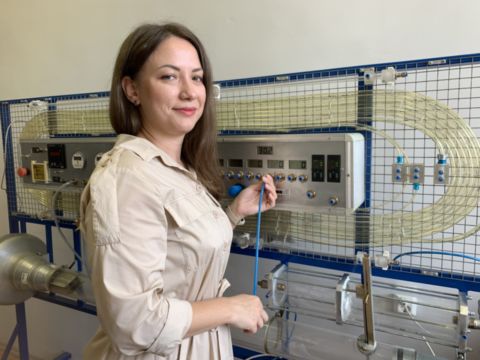The project of a team of researchers from South Ural State University received grant support from the Russian Science Foundation (RSF). The project to develop a device that does not allow the emission of harmful gases from an industrial furnace to prevent and eliminate environmental pollution belongs to one of the strategic directions within the framework of the Priority 2030 program - The eco-environment of post-industrial agglomeration. Previously, the preliminary studies on this topic were published in scientific and university journals.
In oil, metallurgical, and chemical industry chemical reactions occur in reactors (furnaces), and their by-products are aggressive gases. Mechanical shut-off devices - valves with many moving parts - prevent gases from entering the atmosphere. At the time of batch loading of raw materials into the reactor, the valves are open, which leads to depressurization of the furnace and the exhaust of harmful gases. In addition, under the action of an aggressive environment, the valves are subject to wear.
As an alternative to a mechanical device, SUSU scientists propose to install a pneumatic locking device that has no moving elements. In such devices, air counterflow from the reactor outside is to prevent exhaust. Air flows, or a mixture of air and raw materials, enter the reactor and, by creating a pressure drop with the help of vortex and/or ejection effects, ensure the retention of aggressive gases inside the furnace.
“The use of gas-dynamic locking devices ensures a continuous supply of raw materials to the reactor and, as a result, increases the efficiency of its operation. The absence of moving parts of the locking device eliminates the possibility of their wear, which allows avoiding the forced decommissioning of the reactor,” explains the author of the study, Doctor of Science, Professor Evgeny Spiridonov.
The physic-mathematical model of the locking device, created at the SUSU Supercomputer Center, using numerical simulation methods, made it possible to determine the area of achievable operating modes and operational characteristics of the device. Approbation of the operation of the device was carried out on a gas-dynamic stand. The co-author of the project Darya Khabarova, associate professor of the Hydraulics and Hydraulic and Pneumatic Systems Department, assisted the experiment.
The new pneumatic locking device development is of interest to the enterprises of Chelyabinsk and the Chelyabinsk region: metallurgical, electrometallurgical, and zinc industries, mining, and processing plants.
Presumably, development work will be carried out with a complex of enterprises of the metallurgical and chemical industries in the city of Cherepovets. By the end of 2023, it is planned that the project financing will amount to 1.4 million rubles within the framework of the RSF grant.
“Participation in grant support competitions is a system for stimulating the professional growth of young scientists. Thanks to grants, their potential is opened up. And, of course, financial support for new ideas makes it possible to solve the problems in demand in society,” Evgeny Spiridonov revealed the benefits of grant competitions.
Based on the results, the scientists plan to publish at least six articles in peer-reviewed Russian and foreign scientific journals, four of which are in journals indexed in the Web of Science and Scopus databases.
South Ural State University is a university of digital transformation, where innovative research in most priority areas of science and technology development is held. Following the strategy of scientific and technological development of the Russian Federation, the university focuses on the development of major scientific interdisciplinary projects in the field of the digital industry, materials science, and ecology. In 2021, SUSU won the competition under the Priority 2030 program. The university performs the functions of the regional project office of the Ural Interregional Research and Educational Center.




